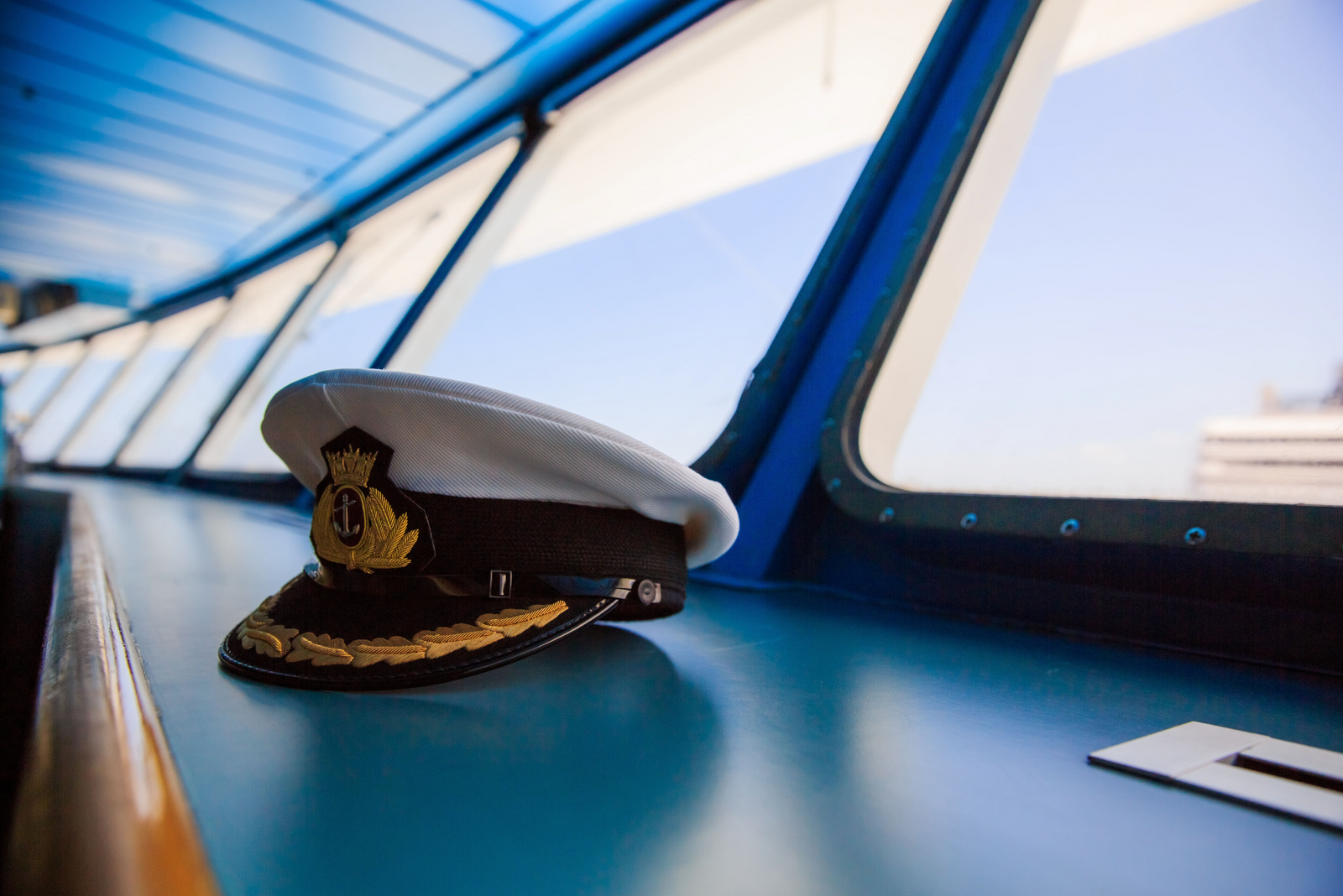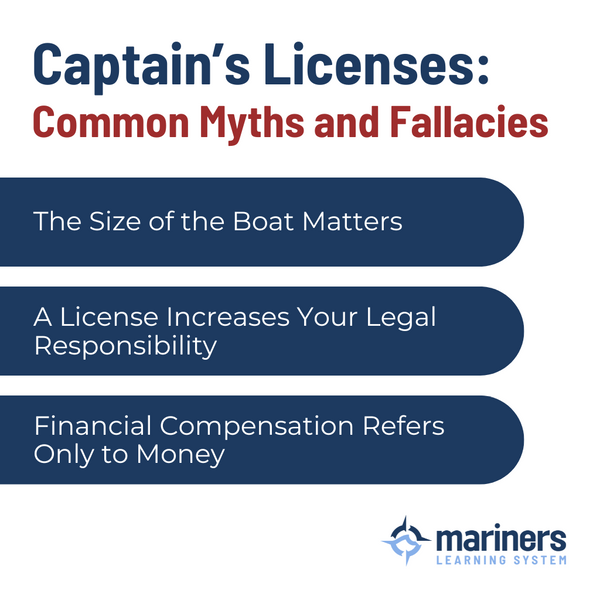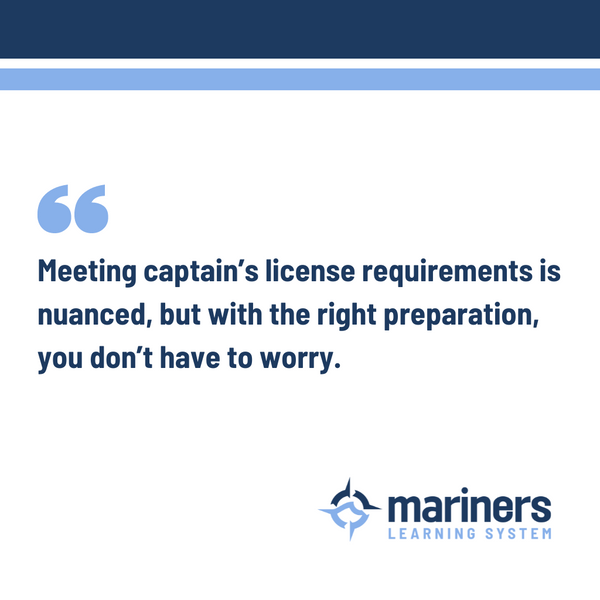Free Shipping On Orders $50+
Free Shipping On Orders $50+

Captain’s License Requirements: Your Ultimate Checklist
by Bob Figular April 16, 2024
Deciding to get your captain’s license is a big deal, but it can bring with it a storm of questions and anxieties.
Can you pass the physical? Are you up for re-entering the world of studying and exams? Will the hours you’ve already put in count toward your captain’s license requirements?
Despite those fears, you want to move forward, maybe to use your license commercially, or maybe for the assurance, safety, and/or achievement of becoming an officially licensed captain.
Whatever your motivation, knowledge is power; we find that fears fade in the face of concrete information.
Below, learn what you need to know regarding captain’s license requirements, how to prepare, and the common myths and misconceptions that hold boaters back.
Basic Captain’s License Requirements
The most common captain’s license is the OUPV or Six-Pack, which allows you to commercially captain a vessel with up to six passengers. To earn this license, you must:
- Be 18 or older
- Have legal status to work in the U.S.
- Pass a drug test and a physical
- Acquire a Transportation Worker Identification Credential (TWIC) card
- Get certification in adult CPR and basic first aid
- Pass a Coast Guard-approved course like Mariners or test directly with the USCG
Finally, you must have a minimum of 360 days experience on the water. Make sure you count your days correctly. Four hours on the water counts as a day, but even if you spend 12 hours out on your boat, you can only count one day in a 24-hour period.
Documentation of your days doesn’t need to be in a written record or logbook. Typically, it boils down to a best guess, and you can sign off your own time if you own your boat. If you’re not logging days on your own boat, the owner of the vessel you use needs to confirm your time.
Either way, make sure the vessel you use is properly registered — the Coast Guard won’t count time on a boat taken out on the water illegally.

Common Myths and Fallacies Around Getting Your Captain’s License
Persistent myths muddy the waters when it comes to captain’s license requirements and consequences. Here, we clear up the most common fallacies to better prepare you for the journey.
The Size of the Boat Matters
People looking to get their Six-Pack captain’s license often worry that their experience won’t count if it’s on the wrong size or class of boat. Luckily, the Coast Guard is loose on these requirements — they treat a 10-foot boat and a 100-foot boat exactly the same. Up to 20% of your time can even be done on a jet ski.
However, though the size of the boat doesn’t matter, the Coast Guard does want your experience to match the type of license you’re getting. The Six-Pack license allows you to captain sailboats and powerboats.
Exception: For a Master Captain’s License, the Coast Guard issues a 25, 50, or 100-ton license depending on the size of the vessels you have experience with.
A License Increases Your Legal Responsibility
Being a captain is a big responsibility, but not an overly burdensome one. Many people believe that having a captain’s license increases your legal responsibility aboard a boat, even as a passenger, but this isn’t the case. You’re only responsible for boats you’re actively captaining.
We also hear worries regarding incidents between boats, and people wonder whether licensed captains incur higher penalties for incidents with unlicensed boaters.
I like to explain it this way: When it comes to the Navigation Rules of the Road, there’s no asterisk that says, “especially if you’re a captain.” The laws apply the same to licensed and unlicensed boaters.
Financial Compensation Refers Only to Money
You need a captain’s license to use your boat commercially, but “financial compensation” isn’t just money changing hands.
If your friends chip in for gas for a day on the water, that’s fine. But if you’re taking a family out on your boat in exchange for a weekend at their country club, the Coast Guard considers that as payment. In that case, you’re required to have a captain’s license.
Potential Captain’s License Disqualifiers
While there’s a long list of factors that might disqualify you from meeting captain’s license requirements, even the most common don’t often pose a huge obstacle. A little knowledge and planning can go a long way toward avoiding issues.
Drug Use and Omissions
The Coast Guard isn’t out to penalize people for one mistake in their past; they’re primarily looking for problematic trends and patterns. One DUI from 20 years ago likely won’t disqualify you (if you have a clean slate since), but three DUIs in 10 years demonstrate a concerning pattern to the Coast Guard.
Important: Remember to disclose all violations, even those that have been expunged from your record. They will come up in your background check. Omitting them from your application will create a bigger issue than a mistake you made and corrected in the past.
Health Challenges
The two most common health problems that might prevent you from passing the physical are sleep apnea and recent heart issues, including getting a stent.
In both cases, the Coast Guard will communicate with your doctor to ensure your conditions are monitored and controlled. They’re looking for a clean bill of health for a minimum of 18 months, and they may also require extra tests such as a sleep study or stress test.
As a licensed captain, you’re literally in charge of people’s lives. The goal of the Coast Guard is to make sure an underlying health condition won’t compromise your passengers’ safety.
Certain Medications
If you take a prescription opioid for chronic pain, you’ll likely run into difficulty getting your captain’s license. Other medications, such as Adderall for ADHD, may pose a problem as well, but the Coast Guard can work with your doctor to make that determination.
Again, safety is the Coast Guard’s number one concern. If you and your doctor show that you can be responsible for people’s lives, then your chance of disqualification is reduced.
One exception is the use of medical marijuana. Though legal in many states, marijuana use still violates federal law, and captain’s licenses are issued at the federal level.

Captain’s License Requirements: Get the Ultimate Guide
Meeting captain’s license requirements is nuanced, but with the right preparation, you don’t have to worry.
Learn more about the requirements and process for earning your captain’s license in our guide: The Definitive Guide to Becoming a Licensed Boat Captain.
Leave a Comment
Comments will be approved before showing up.
